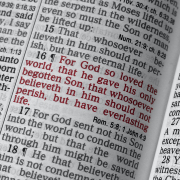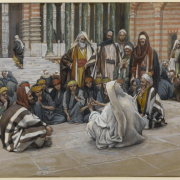Who Was Jesus?
“Jesus was Jewish… which makes sense, because he really loved his mother.” – Joan Rivers
The answer to this question is so simple that a child can begin to grasp it and so complex that we could never plumb its deepest depths.
What can we know about Jesus? As we understand the matter, the Jesus of the New Testament is a Jewish man who participated in the world of first-century Israel under Roman occupation. He is a part of our history, our people. But he is also something more.
As the New Testament asserts, he is the Redeemer promised by God in the Hebrew Scriptures. The Hebrew name from which the name “Jesus” is based is Yeshua (ישוע), which in turn is derived from the Hebrew word meaning “to deliver or rescue.”
His name identifies his mission and purpose in life. That mission is also expressed in the role he plays as the long-awaited Messiah—the “Anointed One”—the one commissioned and empowered to rescue humanity.
The first fact we must come to grips with as we meet Jesus is that he comes to us as a Jewish man. The very first moment we meet Jesus in the New Testament in Matthew 1:1—“The book of the genealogy of Jesus the Messiah, the son of David, the son of Abraham”—we meet a Jesus who is placed squarely in the context of the history of deliverance the God of Israel had already begun to unfold among the children of Israel and toward the rest of the world.
The terms used to describe Jewish messianic expectation in his day, such as “Son of God,” “Son of Man,” or “Son of David,” each reinforced his Jewish identity as well. Devoid of his connection to the prophetic expectation anchored in the Hebrew Bible, any possibility of understanding Jesus simply evaporates. Jesus fulfilled the expectations Jewish people had for the Messiah of Israel.
There is another name by which we know this Jesus, the name that was linked by Matthew to the powerful prophet Isaiah: “Therefore the Lord Himself will give you a sign. Behold, the virgin shall conceive and bear a Son, and shall call His name Immanuel” (Isaiah 7:14). As Matthew noted, Immanuel means “God with us” (Matthew 1:23).
If we accept the proposition that the Gospel accounts are reliable and demonstrate that Jesus lived, taught, and died at the hand of the Romans during the era of late Second Temple Judaism, the question that could then follow is, “So what?” Among the millions of bloody deaths during Roman rule—not to mention the billions of deaths worldwide since—why was Yeshua’s death so different, and what personal meaning could this have for us two thousand years after the event?
This is a critical question, and the waters are a bit muddied by a seeming inconsistency between the biblical record in the Hebrew Scriptures and traditional Jewish understanding regarding the coming of the Messiah. The Bible seems to teach that the Messiah would die for the sins of the Jewish people and the world, whereas Jewish tradition emphasizes the coming of the Messiah as a king and ruler, who would overthrow the enemies of Israel. So, before you answer the question raised about the meaning of his death, this fundamental question must be answered first: What does the Hebrew Bible say about the coming of the Messiah? Was he supposed to die an atoning death for the sins of all? Or, was he to singularly conquer the enemies of Israel and establish his rule in Jerusalem? Perhaps it is both? Why must we choose one or the other? This is why Messianic Jews and all Jesus-followers believe that the Messiah would come twice: once to die for our sins and another time to reign as our king.
Further articles on this site will unpack these topics more fully. We encourage you to take your time and consider these things, even if you have not thought about them before. And as always, ask God for yourself to reveal the truth.
If you want to know more about how to answer this question—“Who was Jesus?”—then there is no better place to turn than the first-century biographies about his life. We would encourage you to investigate and read for yourself!





 Public Domain
Public Domain


